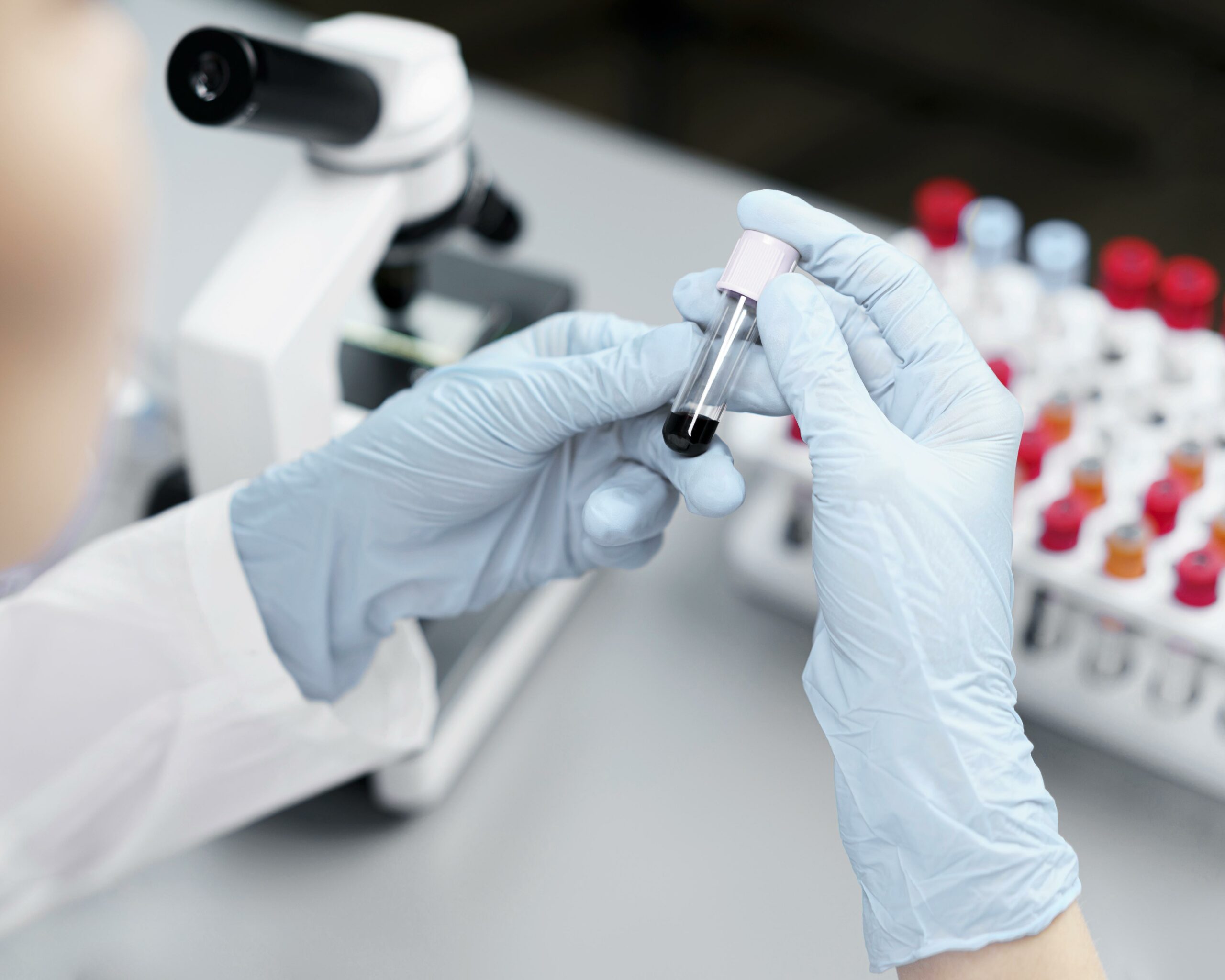Have you ever heard of ferritin? It is an essential body component and we all need to pay attention to it. But what is it exactly? In this article, you’ll learn everything you need to know about this important protein – from its role in our bodies to the symptoms of an imbalance.
The world of proteins can often be confusing, but understanding it is essential if we want to keep our bodies healthy. Ferritin plays a critical role in maintaining our balance and optimal functioning; without adequate levels, we can become unwell. We’ll look at how low levels affect us and how we can get more into our systems to help us feel great again.
So, what is ferritin? Let’s go deeper into its role in the body and explore why it’s so important to stay healthy and energized. With a few simple dietary changes, you could soon get your ferritin levels back on track!
Ferritin – What is it?
Ferritin is a protein used to store iron in the body. The amount of ferritin in the blood can provide information about the health of the iron. According to the US National Library of Medicine, the general free form of ferritin in adults is 12 to 300 ng/mL. The ferritin assay is a special reagent test that can determine the amount of free ferritin. Up to 80% of the iron present is stored in ferritin form. Therefore, the measurement and analysis of serum ferritin is an essential component in the diagnosis of anemia as well as other iron metabolism disorders. The ferritin test provides detailed information about the actual iron status and is therefore an important component of any laboratory test. With this knowledge, we will now address the biological function and biosynthesis of ferritin.
Biological function and biosynthesis
Ferritin is a protein that is present in almost all cells of the body and serves as a store for iron. It can exist in both loaded and unloaded forms. The loaded form is required for the uptake of iron atoms during biosynthesis, while smaller amounts of unloaded ferritin may form a protective barrier, preventing the formation of toxic complexes with free iron. Ferritin can be administered in tablet form or directly as a dietary supplement. The normal value for ferritin (serum) is usually between 20 and 300 ng / ml in blood plasma, but can be affected by certain diseases and other factors. Therefore, it is necessary to perform laboratory tests to determine the actual value.
Laboratory Diagnostics and Serum Ferritin
The level of ferritin in the blood provides information about the body’s iron and vitamin levels. It is a type of ‘iron core’ and helps the body regulate the functions of protein metabolism and balance the amount of iron in the body. With the help of this test and the values obtained, suspected iron deficiency or overload in diseases such as anemia can be diagnosed more easily.
Normally, normal values for ferritin range from 15 to 150 µg/L. If the value is elevated, it may indicate folic acid or vitamin B12 deficiency. In addition, it can also be an indicator of liver disease or inflammatory processes. To detect possible diseases at an early stage, it is recommended to perform regular tests with ferritin:
- Serum ferritin test – measures the level of ferritin in the blood.
- Determination of iron levels in blood – indicates deficiency symptoms
- Measurement of haptoglobin – provides information about possible abnormalities
- Determination of transferrin levels – tracks changes in the transport of minerals
Therefore, it is important to check your levels regularly to detect possible diseases early and treat them quickly. What is ferritin? The answer can be found in laboratory diagnostics and serum ferritin tests.
Reference Levels
Ferritin is a protein found in the body that enables the storage of iron. It consists of an iron core surrounded by protective proteins. Ferritin is transported throughout the body with the blood and can accumulate in various organ systems. When there are excessive levels, we speak of elevated ferritin in the blood.
| Reference levels | Displayed level |
| Men (until 50 years) 30 – 400 μg/L | Increases >400 μg/L |
| Women (until 50 years) 12 – 150 μg/L | Increases >150 μg/L |
| Children (1 month to 6 years) 10 – 70 μg/L | Increases >70 μg/L |
From this table we can see what normal value for ferritin are normal and at what point it can be assumed that there are elevated levels of ferritin in the blood. The discoloration of the urine or the skin pigmentation can give further indications that the ferritin level is too high or too low. With the help of the diagnostic method, we can therefore determine whether or not a patient is suffering from an iron deficiency-related disease. With the latest technology, we can find individually appropriate treatment options to help effectively without wasting resources and ultimately save lives!
The ferritin index is an important part of the diagnosis of hemochromatosis. The ferritin index is a measure of ferritin, an iron-storing protein found in the liver. In hemochromatosis, the concentration of ferritin in the blood increases, which can lead to liver dysfunction. Therefore, ferritin index is an important diagnostic tool to diagnose and treat hemochromatosis.
The ferritin value is an accurate measurement of the amount of iron our body stores. A high value indicates an increased need for iron and may be caused by hemochromatosis, an inherited metabolic disorder in which too much iron is stored in the blood. Other diseases or certain medications can also affect the ferritin index.
Iron is necessary for bone marrow production, immunity, and cellular function; therefore, it is important to provide the body with the proper amount of iron:
- Serum iron levels should be within the normal range (10-220 µg/dl).
- Iron intake must correspond to the individual needs of the human body.
- There are specific dietary recommendations for people with signs of anemia or hemochromatosis to ensure that they always have enough iron.
- It is advisable to have regular check-ups and laboratory tests, if necessary, to check iron levels.
- If hemochromatosis is suspected, you should see your doctor and have further tests done. So, to avoid further imbalance in iron levels, it is important to follow the above steps and follow the doctor’s advice. By taking these precautions, we can protect ourselves in time – both from anemia and from iron overdose – and thus maintain our long-term health. Therefore, it is important to have the level of iron in the body checked regularly via the ferritin level.

Reliable results satisfied patients.
The normal ferritin blood level
Iron deficiency is a common global health problem and blood ferritin levels are important for timely diagnosis. A normal blood level of ferritin is between 20 and 150 micrograms per liter (mcg/L). People with lower levels than this can suffer from iron deficiency because the body cannot produce enough red blood cells to effectively transport oxygen throughout the body. The German Nutrition Society recommends a daily intake of 10 to 15 milligrams of iron per day through a balanced diet rich in iron, as well as intake of iron supplements or vitamin B complex supplements. In many cases, however, under the guidance of a physician, the increased need for iron must be met by supplementary preparations to improve ferritin levels. Thus, patients, in turn, can help alleviate or even eliminate signs and symptoms of iron deficiency.
Low Ferritin Levels – What do they mean?
Low ferritin levels mean that the body is not storing enough iron. This can be due to a variety of causes, including inadequate iron intake, blood loss, lack of absorption of iron by the body, or increased iron consumption. A low ferritin level can lead to anemia, which can cause a number of symptoms, including fatigue, weakness and restlessness. It is important to determine the cause of low ferritin levels and consider appropriate treatment options.
To determine iron deficiency, both the ferritin value and the hematocrit must be determined. The value is usually between 10-150 ng/ml (nanograms per milliliter) and can be treated with specific supplements. According to medical literature, it is necessary to increase the intake of oral iron in order to increase the low ferritin value; treatment with iron tablets is very effective for this purpose. This can eliminate the deficiency and some people soon show positive results.
So iron supplements help to improve low ferritin levels – but what happens with high levels? High ferritin levels can indicate an excess of iron in the body, which can lead to many health problems. Therefore, it is important to have a doctor monitor these levels to find the right balance and maintain a healthy iron balance.
High Ferritin Levels – What do they mean?
High ferritin levels mean that there is an increased amount of ferritin to bind iron in the body. This can indicate various conditions, such as iron deficiency without anemia or latent iron deficiency. If iron deficiency is suspected, it is recommended that administration of iron supplements be considered. The ferritin value is one of the most important laboratory values and is considered the central laboratory value for the diagnosis of iron deficiency anemia. Thus, a high ferritin value usually indicates anemia and therefore must be treated without fail – often with iron tablets. But are there alternatives to tablets? In any case, you should ask your doctor which treatment method is most suitable!
Iron therapy and measuring iron stores
It is important to measure the iron stores in the body to start iron therapy. Ferritin is a protein and the best indicator of the amount of iron present in the body. Our body relies on this iron-laden protein to use all of our iron stores and meet our daily iron needs. By measuring serum levels of ferritin, we can determine the status of total iron stores and thus make statements about the relationship between iron deficiency and health status. Especially during pregnancy, higher levels of ferritin are necessary to meet all the requirements of the increasing demand for iron.
Ferritin value measurement
Ferritin value is usually measured by a blood test. The test measures the amount of ferritin in the blood.
The ferritin value is measured to determine the amount of iron in the body and to determine iron requirements. The value provides information about the iron stores in the human body. By measuring it, medical guidelines for treatment or dietary recommendations can be adjusted if there is an increased need.
An examination quickly provides the physician with information on whether or not it is necessary to prescribe preparations containing a lot of iron. The ferritin value is thus the most important parameter in the diagnosis of iron deficiency; without it, an accurate diagnosis cannot be made. Thus, the blood test enables physicians to make appropriate recommendations based on the values and to determine measures to alleviate symptoms. With this help, symptoms can be reduced in the long term and health can be protected.
It is therefore essential that laboratory values are regularly determined by the doctor in order to detect changes at an early stage and to be able to treat them in a targeted manner.
In which cases is the value determined?
The ferritin value is often determined to diagnose iron deficiency. It helps to better assess iron requirements and absorption, and to detect anemia or other blood disorders. Screening is especially important for people who are at higher risk for iron deficiency, such as pregnant women and nursing mothers. Iron supplements are often required to raise ferritin levels. Therefore, ferritin levels must be checked regularly to assess the effectiveness of the supplements. It is also important to eat iron-rich meals to naturally raise the level. With regular blood tests, symptoms of low ferritin can be detected early and serious consequences can be avoided.
Low ferritin can cause symptoms such as fatigue, dizziness, headaches, concentration problems, muscle weakness, hair loss, sensitivity to cold and rapid fatigue.
But before it gets to that point, there are several warning signs that should not be ignored. These include fatigue over a long period of time, severe fatigue and decrease in performance, and endurance problems. In addition, loss of appetite, nausea, hair loss and brittle fingernails or dry skin are typical accompanying symptoms of a low ferritin level. Therefore, it is important to consult a doctor and have appropriate tests done to clarify whether the condition is actually due to low ferritin or if there are other causes. Proper testing can determine if the body is storing too much iron (elevated ferritin) or if the amount of stored iron in the blood serum is below normal (low ferritin level).
In any case, it is important to find out what exactly is happening in the organism – because no matter whether we want to get rid of toxins or do something good for the body – without professional help our efforts will ultimately remain in vain. So in the end the question is: Is our organism toxic or optimal?
Reasons for low values
Reasons for low ferritin levels are: insufficient intake of iron in the diet, blood loss, increased excretion of iron by the body, disturbed iron exchange between cells and disturbed iron metabolism in the body. Other factors that can cause low ferritin levels include conditions such as anemia, cirrhosis of the liver, kidney disease, chronic inflammation, hypothyroidism, use of certain medications, and poor circulation.
Some people need more than the recommended dose of vitamin C to maintain their ferritin levels. In more serious cases, chronic diseases as well as overdose of iron supplements require special medical treatments. Abnormal levels should therefore always be checked by a doctor. With proper diet and supplement use, normal levels can usually be restored. However, because potentially serious consequences can accompany low ferritin levels, individuals with this symptom should seek urgent medical attention.
Too little iron intake is a possible cause of a low value
A low ferritin value may indicate an insufficient absorption of iron in the body. Therefore, the German Nutrition Society (DGE) recommends consuming more foods with a high bioavailable iron content, especially for those on a vegan diet or those with an increased iron requirement. Vitamin C supports the absorption of iron and helps to keep iron levels at a healthy level. Therefore, you should see your doctor and have all the necessary tests done to determine if you are suffering from an iron deficiency. Here’s how to stay healthy and fit!
Low iron levels can be caused by an increased need for iron. This can be caused by various factors such as increased iron release into the body (e.g. in pregnant women), excessive blood loss (e.g. during heavy menstruation) or increased absorption of iron through food (e.g. in meat, eggs and legumes).
Blood loss as a reason for a too low value?
Insufficient iron absorption into the body can lead to a low ferritin value, but blood loss also affects the values. Particularly in cases of extreme blood loss or if the loss continues over a longer period of time, a significant drop in the value can be observed. Red blood cells and red blood cells – which contain the red blood pigment – deliver different amounts of oxygen to the body. A healthy person has enough of it to meet his or her needs; however, it depends on various factors: Reference ranges vary minimally from laboratory to laboratory, which can mean that even individuals with normal ferritin levels can be considered ‘below normal’. In addition, research results show that vitamin C and milligrams of iron per day have positive effects on levels. Excessive alcohol consumption also contributes to raising the level to peak levels.
Since one can often be hereditarily predisposed or have other conditions – such as gastritis or leukemia – one should have occasional tests to ensure that ferritin levels are within health limits. This allows early signs to be detected and treated so that potential problems can be avoided. So, in order to make an Iron-Deficiency Anaemia (IDD) diagnosis, it is necessary to measure ferritin levels and thus take countermeasures accordingly.
Increase ferritin level
Ferritin is a type of protein store that stores iron and protects the body from iron deficiency without anemia. The ferritin value corresponds to the stored iron content in the blood and is also used as a marker for the absorption of iron. This iron participates in various functions of the human body, such as replenishing existing iron deficiencies, treating chronic diseases that can cause blood loss, supporting immunological responses, forming new red blood cells, and storing iron in mitochondria as an antioxidant. To increase ferritin levels, it is recommended to take supplements and review dietary consumption to add foods high in iron. Regular doses of vitamin C can improve the absorption of minerals, which can increase ferritin levels and improve overall health. The following is a discussion of ‘ferritin as a tumor marker’.
Ferritin as a tumor marker
Ironically, ferritin is not only present in our body as a store of iron, but it is also used as a tumor marker. The ferritin value is a quantitative measurement of the protein bound to iron in the blood serum, and the highest value represents the greatest amount of iron in our body. This protein can be increased by food or supplement intake, but there are other factors that affect ferritin levels, including inflammation-independent conditions as well as an increased need for vitamin C and red blood cell breakdown.
Excess iron in the body can lead to various diseases such as acute iron deficiency syndrome or hemochromatosis. Therefore, it is very important to check the ferritin level regularly and, if necessary, take measures to regulate it optimally. It is possible that the doctor may recommend certain tests and prescribe antioxidants or diuretics to lower ferritin levels in patients at high risk for heart disease or other serious conditions. In addition, attention should be paid to diet and exercise, as this can help maintain proper levels of ferritin.
Conclusion
Ferritin is an essential component to maintain healthy iron levels in the body and can treat anemia when used properly. It is like a key that opens the door to better health; with it, we can unlock our potential by having enough energy to do what needs to be done.
To make sure ferritin levels are adequate, blood tests should be done regularly to detect deficiencies or imbalances early. I recommend supplementing your diet with foods rich in iron if you have low ferritin levels, such as red meat, fish, eggs and leafy greens. And of course, always consult your doctor first before taking any type of supplement!
Overall, understanding how important ferritin is to overall health gives us insight into why it is so important to keep these levels balanced and regulated. With this knowledge, we can now take steps to live a more energetic life full of vibrancy and vitality.
If you are looking for ferritin tests and other inflammation markers then you have come to the right place! Discover our assortment – Click here to go to our product categories.

Improve diagnostic quality.
Frequently Asked Questions
What is the role of ferritin in the development of cancer?
There is evidence that high levels of ferritin in the body may be associated with an increased risk of cancer. However, it is not yet clear whether high ferritin levels are a risk factor for cancer or whether they are a consequence of cancer.
How can ferritin levels be interpreted in patients with chronic inflammation?
Ferritin levels can be elevated in patients with chronic inflammation, regardless of whether iron deficiency or iron overload is present. Interpretation from the blood level for ferritin in these patients can be difficult.
How can ferritin values be interpreted in patients with liver disease?
Ferritin levels may be elevated in patients with liver disease due to liver inflammation or liver damage. Interpretation of ferritin values in these patients can also be difficult.
How can ferritin values be interpreted in pregnant women?
Ferritin in women who are pregnant may be elevated due to the increased need for iron in the body. Therefore, interpreting ferritin values in pregnant women can be difficult.
How can iron deficiency anemia be diagnosed in patients with normal ferritin levels?
There are cases in which patients with iron deficiency anemia have normal ferritin levels. In these cases, diagnosis can be difficult and may require other tests such as blood iron binding capacity.
How can ferritin values be interpreted in children?
Ferritin levels in children vary by age and gender and may be higher in young children due to increased iron requirements. Therefore, interpretation of ferritin values in children can be difficult.
How can ferritin values be interpreted in the elderly?
Ferritin levels in the elderly may be elevated or decreased due to age-related changes in the body and other conditions such as cancer and kidney failure. Therefore, interpreting ferritin levels in the elderly can be difficult.
What are the effects of too high ferritin levels on the body?
Excessive ferritin levels can cause iron overload in the body and damage various organs, especially the liver, heart, and pancreas.
How can ferritin levels be interpreted in vegetarian and vegan diets?
Ferritin levels may be lower on vegetarian and vegan diets because iron-rich foods such as meat and fish are avoided. Therefore, interpreting ferritin levels in people on vegetarian or vegan diets can be difficult.
How can ferritin values be interpreted in patients with chronic kidney disease?
Ferritin levels may be decreased or increased in patients with chronic kidney disease due to iron metabolism disorders. Interpretation of ferritin levels in these patients can be difficult and may require further testing, such as determination of the degree of transferrin saturation in the blood.
You may also be interested in
Tumor Marker




